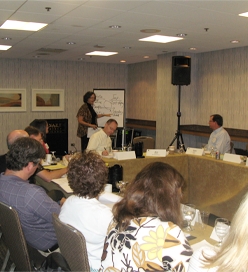 State Funding for Higher Education
State Funding for Higher Education
Higher education, like many areas of state spending, has experienced public funding erosion in today’s challenging budget environment. Yet, higher education’s financial problems are unique in some respects because post-secondary institutions have other sources of revenue in addition to state appropriations. The availability of alternative revenue sources, such as tuition and fees, helps explain why state funding for higher education tends to be more volatile than for other program areas. While state appropriators are typically generous to higher education in good fiscal periods, they sometimes tend to disproportionately cut funding during severe revenue downturns.
In recent years, many institutions of higher learning and state policymakers have responded to tough fiscal constraints by shifting a larger share of the financial burden from taxpayers to students, rather than by thoroughly examining and reducing costs and/or improving efficiency. Despite funding cuts, however, state dollars and policy decisions still play a key role in the public higher education system. States thus have the ability, through policy development and the budget process, to seek post-secondary education reforms that lead to better outcomes, such as higher completion rates, increased access, and greater earning potential with less student debt.
State Budget Offices Have a Role to Play in Higher Education Reform
State budget directors and higher education budget analysts assembled in Chicago, Illinois, on August 23rd to discuss how states can leverage the budget process to better achieve the goals of the public higher education system. Support provided by the Bill and Melinda Gates Foundation helped bring together representatives from 24 state budget offices, NASBO staff, and Jane Wellman, the founding Director of the Delta Cost Project, a non-profit organization devoted to developing data and policy tools to improve performance in the postsecondary education system.
States Share Efforts to Improve Performance and Increase Efficiency
Jane Wellman opened the budget officers’ discussion by presenting key findings from her background paper commissioned by NASBO that describes the funding landscape for higher education institutions and degree programs across the states. Throughout the session, attendees covered a wide range of budget topics related to state higher education finance. Participants analyzed and discussed how their states have established certain funding mechanisms and formulas to try to restrain tuition increases by public colleges and universities, particularly in the post-recession period when many states had to cut public spending for higher education institutions. Also discussed were initiatives to tie funding to performance measures and to create incentives for institutions to concentrate resources on degree programs most in need for states’ specific economies.
During the discussion, budget officers also highlighted the dual challenges associated with preserving access and need-based financial aid while at the same time rewarding institutional performance. Various methods to control costs, improve administrative efficiency, and enhance higher education cost transparency were among the recommendations states discussed as part of their efforts to improve budgeting for higher education.
The Road Ahead: Challenges & Opportunities
Major challenges and opportunities exist to improve the effectiveness and efficiency of the public higher education system through state funding strategies, and the session’s participants revealed how much progress has been made and how much more work remains to be done in this area. The experiences, ideas and insights shared by state budget officers at this convening can be accessed in more detail later this year with the publication of NASBO’s written report on public higher education finance.